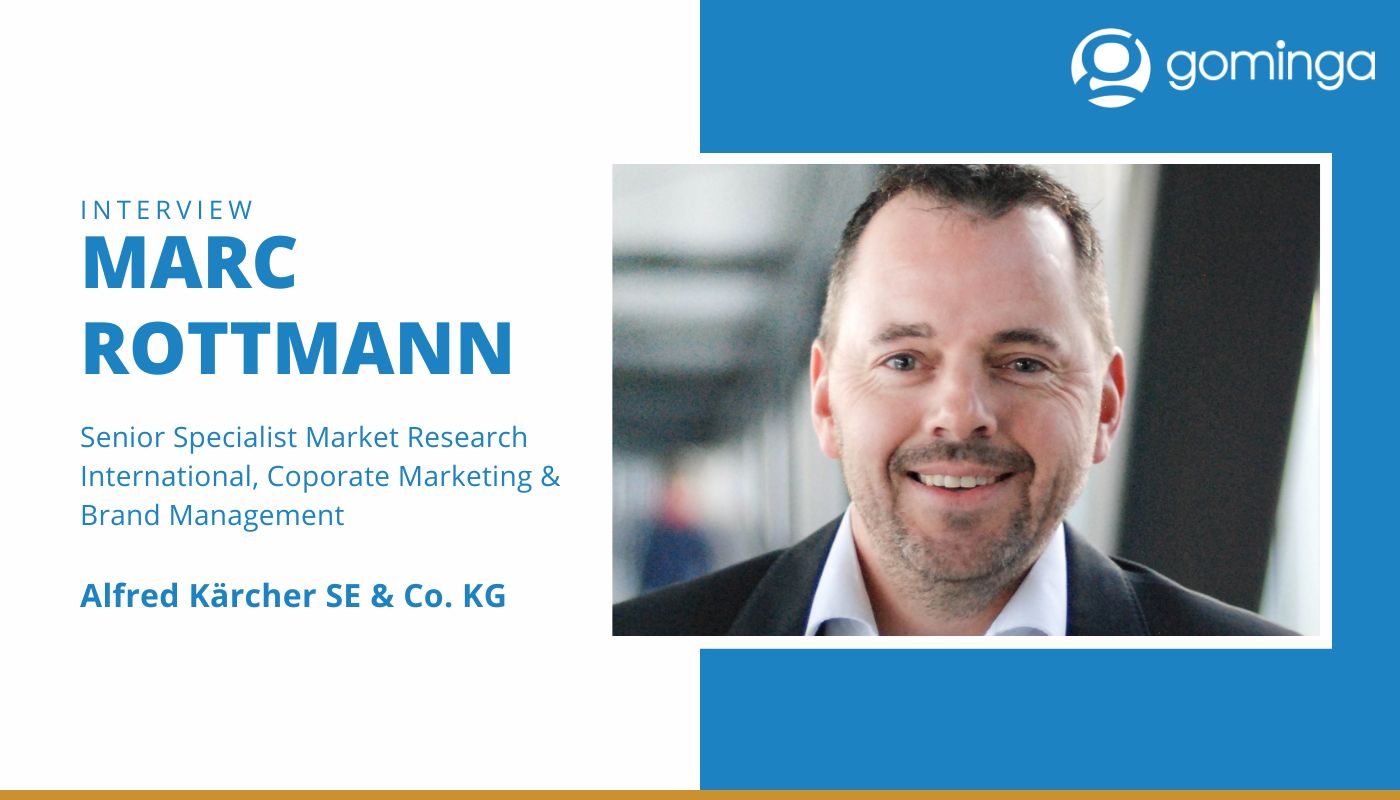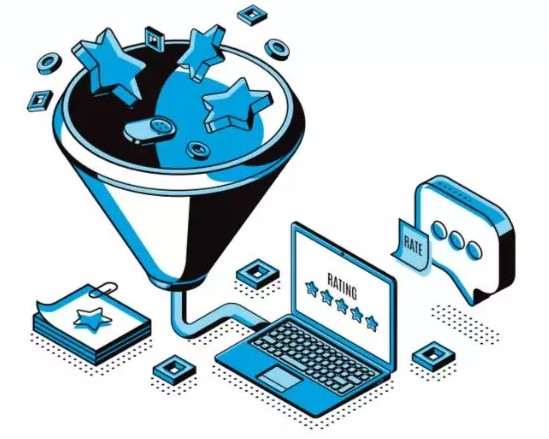
Cleaning specialist Alfred Kärcher now listens very carefully to what their customers say about their own products on Amazon and in their own online shop. From the collected insights, concrete actions follow.
Marc Rottmann, Senior Project Leader Market Research at Alfred Kärcher, looks a little behind the scenes as the company successfully analyzes online reviews using gominga’s software.
Stars were yesterday, text analysis is the future!
How important are reviews and Q&A for Kärcher?
M.R.:We started analyzing customer voices in the social media sector six to seven years ago. There were always some reviews to be found. And when we entered rating and review monitoring three to four years ago, we were still rather cautious, thinking “Let’s see what we can do with the star ratings.” When we published our own first market research study analyzing how reviews affect the purchase decision, things moved upward very quickly. With the study we were able to confirm our always existing gut feeling that 20 to 30 percent of the buyer potential will be eliminated if products are rated with less than 4.0 stars. Now, departments come to us with questions almost daily. Product management and quality assurance in particular benefit greatly.
On which platforms do you collect customer feedback?
M.R.: For Kärcher, Amazon is of course a very important channel throughout Europe. But also our own web presence plays an important role. These are primarily the two channels that we track from the past. In addition, our foreign subsidiaries are also active on other platforms. And the construction markets are also becoming increasingly important in terms of customer engagement. In the future, we want to do more
In addition to product reviews on marketplaces, are other reviews important to you, such as seller reviews or reviews in the app stores?
M.R.: By tracking review data, we have initiated a lot internally. For about half a year we have been in close contact with colleagues who are driving the topic of mobile app development. We do a lot in this area, so the tracking of app stores is definitely a relevant topic for the future. We also looked at Google Locations as a test balloon. Touchpoint analyzes along the entire customer journey, both online and offline, are also becoming more and more exciting for us.

You mentioned earlier that product management and quality assurance benefit greatly from review management. Can you explain that in a little more detail?
M.R.: Of course, our product management has a great interest in learning how their products and accessories perform. Here – in consultation with our international colleagues – we coordinate which products are analyzed at all. By now, we are moving away from pure star ratings to sentiment analysis and text mining. For quality assurance, it is very exciting to learn what our customers say in terms of handling, volume or weight. But review management is also important when it comes to planning new products. For example, we use predictive analytics to try to predict the future based on the numbers. Product management is also agile when it comes to planning new products. On the basis of the tool, innovation workshops are
initiated. And marketing checks whether we are setting the right focus in communication. Here, the product Q&A area on Amazon is also very informative
How important is review management at Kärcher for competitive analysis?
M.R.: This is important today, but it will become even more relevant in the future. For example, we are already analyzing on various dimensions what customers mention positively or negatively when it comes to competing products. We often score points in terms of performance and quality. But perhaps customers see other products as better in terms of convenience or ergonomics. At the moment we are still focusing very strongly on the star ratings. But in the long term, the pure star value no longer helps us, but we need sentiment analyzes and AI systems that can analyze the strengths and nesses of Kärcher compared to the competition from a customer perspective.
Does review management, in your view, complement or even replace traditional market research?
M.R.: At the moment, I would speak of supplementation. I do believe that qualitative studies with focus groups that are close to the customer as well as quantitative online surveys remain important for us. But in the meantime, the customer also provides us with his assessment free of charge. Here we no longer have to survey samples. Of course, as a market researcher, you look critically at the methodology for the first time, because we are no longer dealing with classical representative samples. But it’s a new way to ask for customer opinions. And I have to say very clearly that review management also makes life easier as a market researcher. Collecting this mass of data is easier in this way. And besides, you only ever get a certain truthfulness through questioning. In a review where a customer is angry, their opinion is more honestly reflected. And yes, if we got rid of ratings and reviews today, I would miss something.
Do you see a direct link between reviews and the purchase decision?
M.R.: Definitely – not only as a market researcher, but also as a private individual. When you get comparable brands displayed on Amazon at a comparable price, the person starts to look for other factors that bring trust in your buying decision. And undoubtedly no one will buy the product rated with 3.2 stars if another one has 4.2 stars at the same price. And I mentioned our internal study at the beginning. We saw a clear break in the conversion rate from 3.9 or 4.0 stars. Changing this value upwards is difficult. The mean is relatively sluggish.
Do you think you can influence review quality through review management?
M.R.: I don’t have any hard data on this, just a personal experience. I recently bought a product where a part didn’t work. After I wrote a review, two hours later feedback came from the company. I was offered to either return the product or keep it at a discount. That didn’t sound like a pre-formulated standard reaction, but like someone looking for a good solution for both sides. After I accepted the discount, I also received a relatively quick reply as to whether I would not reconsider my rating if my problem was solved. That was so charmingly worded that I actually did it. Maybe a lot of people are a little too lazy to change reviews once they have been submitted. But I still believe that it does something to a customer when they realize that a company does not just take up the cause of customer centricity, but really lives it. With Kärcher, mouth-to-mouth propaganda also works quite well. And when someone talks about his Kärcher problem at the barbecue and how we helped him quickly, that is positive for our brand.
Why did you decide to work with gominga’s software?
M.R.:We want to improve customer engagement and gominga moved into my focus because the tool takes also text mining and sentiment analysis into account. Stars were yesterday. Text analysis is the future.
In your view, does Kärcher give customer feedback in the form of reviews and questions the attention it deserves?
M.R.:Absolutely. In the early days, the impulse still came from us intrinsically. The push has quickly become a pull internally. Now, review management is a no-brainer for us.
Final question: What are the two top topics for you in the marketplace business that you particularly deal with or want to deal with?
M.R.:For me, one of the exciting questions is what happens to Amazon in terms of customer engagement as a whole. Are restrictions coming? And then we have to assess even more precisely that the world is not just made up of Amazon. That was our pilot. Now we must focus on other relevant platforms in other regions and also use AI in a more targeted manner. These are the construction sites for me as a market researcher.
A big thank you to Marc Rottmann for the interesting insights. You can find this case study and many more insights in our Marketplace Study 2022.
 About the Marc Rottmann:
About the Marc Rottmann:
Since completing his studies at Pforzheim University, the graduate business economist (FH) has been working for Kärcher and focuses as a project manager primarily on the topics of qualitative B2C and B2B market research, customer typologies / consumer profiles and Rating & Review Monitoring.
